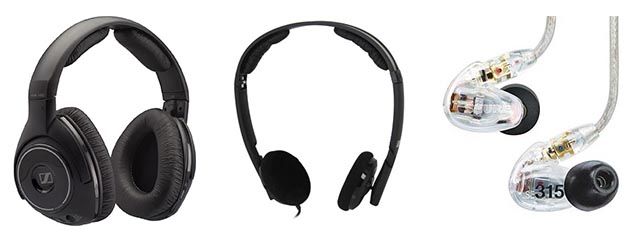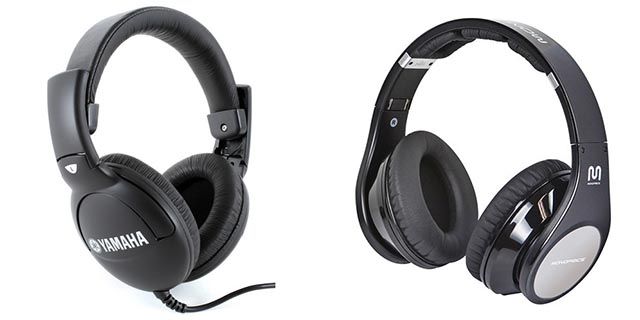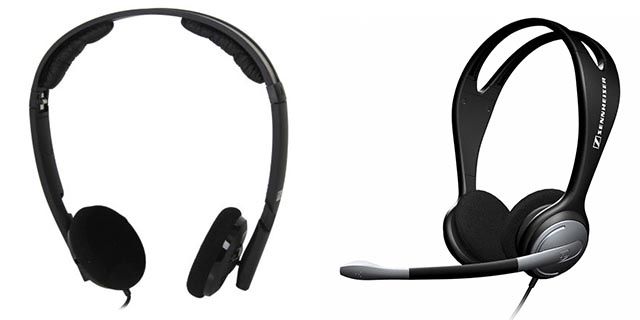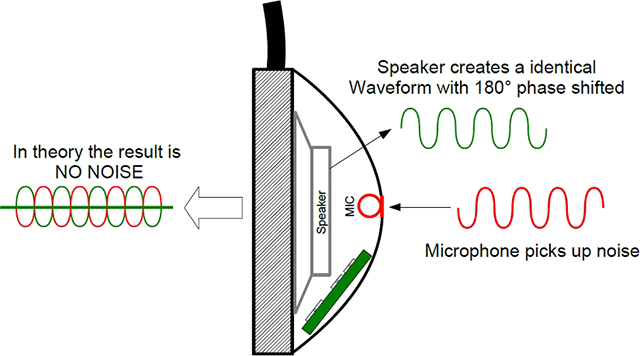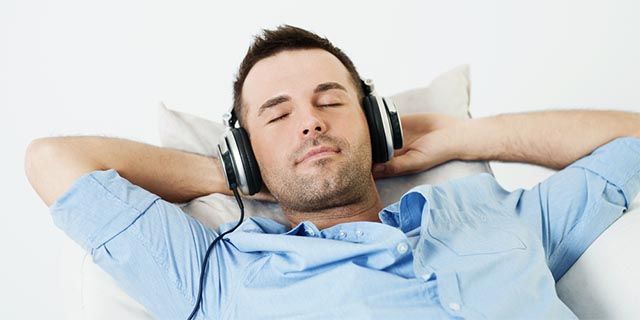There's no such thing as a "best" pair of headphones. The one you should get is entirely dependent on your budget, your setup, and what you're going to be using the headphones for. Forget about price tags. Sometimes, the $50 headphones may end up being better for you than a $400 pair. It's all about context.
How do you determine the "best" pair of headphones then? Here are some things to keep in mind before you commit to a purchase.
Over Ear vs. On Ear vs. In Ear
All headphones fall into one of three categories based on how the headphones actually interact with your ears.
- Over Ear (circumaural) headphones have full-sized cups that completely cover the ears. These tend to have better sound quality at the expense of being heavier and more cumbersome.
- On Ear headphones have smaller pads that rest over the ear canal. They tend to be lighter and more comfortable than over ear headphones but personal preferences may vary.
- In Ear headphones are placed inside the ear canal. For the most part, these are the lightest type of headphones. Depending on the make and price, some in-ear headphones can have amazing sound reproduction.
As a rule of thumb, if you need noise cancellation or superior audio quality, go with the over ear type. If you want to balance quality with comfort, choose on ear. If you're always moving around, in ear may suit you better.
Wired vs. Wireless
As with most electronics, headphones come in wired and wireless varieties. Choosing between the two is pretty straightforward depending on how much portability you need.
Wired headphones are tethered. If you're going to sit at a computer for hours, they're perfectly fine. If you're hooking them up to a phone or MP3 player and you intend to keep said phone or MP3 player on your person at all times, wired works fine. Wired tends to be cheaper but not always.
Wireless is great if you're going to move around a lot (such as pacing around a studio while producing music) or if you just don't want to deal with the hassle of a cord. Wireless headphones with radio frequencies may interfere with other frequencies in the air. Bluetooth headphones are less likely to run into interference but also have a shorter range.
Remember that with wireless headphones, you'll also have to deal with batteries, charging, and making room for a transmitter. In terms of sound quality, wireless headphones come pretty close to wired models. Although purists may claim otherwise, wireless technology has advanced a lot in the past few years.
Headphones vs. Headsets
Technically speaking, headphones refer to the pair of speakers that produce sound. A pair of headphones that includes a microphone is called a headset.
Between the two, headsets tend to be of lower quality than equally priced headphones. If quality is your utmost concern, it'd be smarter to buy a dedicated pair of headphones and a separate dedicated condenser microphone like the Blue Microphones Snowball. However, headsets can be worth it simply for the convenience factor.
Headsets tend to be most popular amongst gamers who communicate via voice chat since audio quality doesn't really matter all that much as long as you can be heard. For most other scenarios, headsets fall short of the dedicated headphones and microphone combo.
Dead set on buying a headset? Get the most bang-for-the-buck with one of these awesome gaming headsets.
Noise Cancellation vs. Noise Isolation
Not all headphones labeled "noise cancelling" are true to their description. Some of them simply isolate noise rather than cancel noise. It's confusing, I know, but here's how you can tell the difference between the two.
Noise cancellation headphones have a built-in microphone (not always overt) that picks up outside sounds. The headphones then produce a reversed sound wave to cancel all outside noise. This process requires extra power, so most noise cancellation headphones have an on-off switch to activate the feature.
Noise isolation headphones, on the other hand, work by sealing off outside noise. In ear headphones can create a seal directly in the ear canal and over ear headphones can create a seal around the entire ear depending on the construction of the cup. Isolation doesn't require any extra power and there won't be any on-off switches for it.
In practice, neither is perfect. Noise cancellation is effective against low frequency hums but not so effective against voices. Noise isolation muffles noises so that they're less noticeable but not gone.
Also, headphones with noise cancellation will have a noticeable price bump. If you're on a budget, you may want to consider these three affordable noise-cancelling headphones.
Comfort and Quality
The last considerations to make are long term comfort and audio quality.
Long term comfort has many factors. The shape of the headphones may cause your ears to go sore after 10 minutes, 30 minutes, or a few hours. The weight of the headphones may fatigue your neck muscles over time. Headphones that are too small or too tight can cause headaches.
Audio quality is determined by the clearness of sound and the ability for the headphones to accurately reproduce sounds. Some headphones have too much bass and sound muddied. Others don't have enough bass, which can end up sounding too metallic and tinny.
There's only one way to guarantee satisfaction for comfort and quality: you have to try it before you buy it. Online reviews can give you a sense of what to expect, but you never really know until you wear it and hear it for yourself. Whenever possible, it's recommended that you visit a local audio store for a sound test.
Conclusion
If all you need is a lightweight pair of headphones for listening to music on your morning jog, there's no need to spend loads of cash. If you're a bachelor and work from home in the comfort of silence, the extra costs of noise cancellation may not be necessary.
Figure out what you need from your headphones - make compromises if you're on a tight budget - and you'll save money by foregoing those unimportant extraneous features.
Do you know of any other tips and tricks to maximize value on headphones? We'd love to hear what you have to say. Please share with us in the comments!
Image Credits: Noise Cancellation Via EDN Network, Relaxed Guy Via Shutterstock


